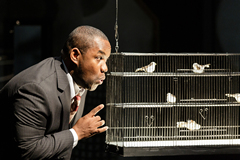| Opera Reviews | 27 April 2024 |
A caged bird singsby Steve Cohen |
|
| Schnyder: Charlie Parker's YARDBIRD Opera Philadelphia 5 June 2015 |
|
|
So I welcome this new opera which attempts to humanize the be-bop saxophonist Charlie Parker. YARDBIRD, however, leans too far towards lionizing him. Hagiography undermines the drama of a man who hurt family and friends even while he was an artistic virtuoso. Let's remember that Parker was not committed to a mental institution by racist enemies, but by his own friends who feared for his life. And he was barred from Birdland, the jazz club named in his honor, because of his disruptive actions. Many other musicians (Bunny Berigan, Bix Biederbecke, Bob Zurke) were alcoholics but Parker set a new standard for drunken, drugged-out antisocial behavior. YARDBIRD shows a person misunderstood and oppressed, a caged man yearning to fly away to a better place. He sings about racial segregation: "I ain't gonna sit in the back of the bus no more...back of the line, filling up jails, hanging from trees. No!" The opera thus tries to use Parker as a representation of racial oppression during that era. But it doesn't ring true. Parker had far more access to upper-crust society than other black people. He had a circle of multiracial enthusiastic supporters. He lived with white women and that was accepted by his friends (although not by the management of the hotel where Parker died). Parker's persona in Wimberly's libretto is a sturdy, well-dressed businessman, and Lawrence Brownlee's stolid acting in the title role contributed to the image. There's no indication that this man was severely physically impaired, with acute cirrhosis of the liver by the age of 34. No reflection of what one of his women sings: "You needed a shave. You looked like you slept in your clothes for days...like a big hairy ape had escaped from someplace scary." What a wasted opportunity for drama! What's more important is Parker's music. His improvisations made colorful use of "passing tones," which are notes not included in normal harmonies, breaking the confines of simpler jazz soloing. He also displayed rapid sliding scales. Schnyder cleverly includes such devices in his score. The orchestral writing suggests where Parker might have been heading, blending bop with serious impressionistic writing. The vocal score, on the other hand, is full-out opera. Brownlee and all of the cast sing with traditional operatic projection, declaiming their lines almost like Alban Berg's 1925 Wozzeck. (There are no jazz inflections as in, say, Porgy and Bess.) The contrast is disconcerting; it distances the characters from the audience even as it separates them from Parker's musical milieu. There's insufficient echo of Parker's music in the vocal writing. Brownlee's singing was excitingly florid, with Bird-like arpeggios. This was not surprising from a man who's known for Rossini's elaborate cabaletti, but Brownlee added unexpected eloquence. Baritone Will Liverman contributed warm partnership as Dizzy Gillespie. Angela Brown sang dramatically as Parker's strong mother. Rachel Sterrenberg was tender in her solo where she asks Parker to let her light up his life. Chrystal Williams was equally heartfelt as another one of Parker's wives.Angela Mortellaro was fine as yet another Parker wife, while the excellent mezzo Tamara Mumford seemed uncomfortable in the role of Parker's patroness, the Baroness Pannonica de Koenigswarter. It was in the baroness's room at the Hotel Stanhope where Parker died in 1955. This opera chose, instead, to set his death in the jazz club Birdland. I suppose this made for a more logical backdrop for the appearances of all of Parker's mother, his ex-lovers and his drug dealer. The setting was confusing for some audience members. Parker did not actually return to Birdland; this is all metaphorical and Parker is already dead. The librettist's achievement here is a poetical and allegorical restatement of racial injustice more than it is a human drama. (Is this a trend? The same company's Oscar was likewise a tract about homophobia and a paean to Oscar Wilde's immortality more so than a dramatic narrative.) Corrado Rovaris drew expressive playing from the chamber orchestra, and he deserves credit for putting this enterprise together.
|
|
| Text ©
Steve Cohen Photo © Dominic M. Mercier |

 When I was a teenager I was more interested in jazz than classical music. My friends and I went to clubs to see and hear Dizzie Gillespie, Charlie Ventura, Lionel Hampton, Gene Krupa, Illinois Jacquet, Woody Herman and Billy Eckstine. For my college radio station I interviewed most of them and found them to be thoughtful and intelligent, contrary to their widespread image as disreputable hop-heads. Yes, they smoked weed and talked openly about using heroin; but they had to be analytical, rational people to think up their intricate patterns of rhythm and pitch.
When I was a teenager I was more interested in jazz than classical music. My friends and I went to clubs to see and hear Dizzie Gillespie, Charlie Ventura, Lionel Hampton, Gene Krupa, Illinois Jacquet, Woody Herman and Billy Eckstine. For my college radio station I interviewed most of them and found them to be thoughtful and intelligent, contrary to their widespread image as disreputable hop-heads. Yes, they smoked weed and talked openly about using heroin; but they had to be analytical, rational people to think up their intricate patterns of rhythm and pitch.





